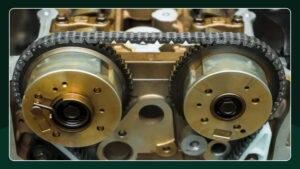
6 Causes of Timing Chain Noises in Cars
The timing chain is a vital component that connects the camshaft and crankshaft and synchronizes their rotation. If you’ve ever seen a chain on a bicycle, the timing chain looks very similar.
There are several pulleys and gears that power the camshaft, crankshaft, and other mechanical components of the system. The timing of their rotations is very important for the engine to function properly. This can only happen if the timing chain rotates smoothly on the gears.
Main causes of timing chain noise
Timing chains tend to last a very long time, even longer than timing belts. However, they are also very fragile components, so they cannot remain stable forever. If there is a problem with the timing chain, one of the first symptoms you will notice is noise.
Depending on the root cause of the noise, replacing the problematic timing chain may be the solution. You will need to find and fix the cause to eliminate the noise. Here are the 5 most common causes of timing chain noise:
1) Normal wear
The most common cause of timing chain noise is when the timing chain is simply worn out. Years of wear will cause it to lose its functionality.
Even if you change your oil properly and maintain your engine regularly, you cannot completely avoid timing chain problems. These measures will only extend its life. However, the timing chain will eventually wear out. The first sign of this is noise.
2) No Engine Oil Changes
In most cases, oil changes should occur every 3,000 to 5,000 miles, or at the oil change interval recommended by your vehicle manufacturer. Oil is important to lubricate the components of your engine, including the timing chain.
If you don’t change your oil regularly, the quality of the oil will deteriorate. This means that it won’t be able to lubricate as well as it used to. When this happens, your timing chain will wear out faster than normal.
3) The wrong engine oil
In addition to changing your oil regularly, you also need to use the right type of oil for your engine. Check your car’s owner’s manual to see what quality and viscosity of oil the manufacturer recommends.
You should also choose an oil that contains anti-wear additives. Even if you have to pay more for synthetic oil, these additives extend the life of your timing chain, so it’s often a worthwhile investment. On the other hand, choosing an oil with the wrong viscosity for your engine can lead to premature wear of the timing chain and increased noise.
4) Faulty Oil Filter
Oil filters are mounted on the top or side of the engine. These filters have a return valve that prevents oil from flowing out of the filter after the engine is shut off.
This leads to delayed lubrication of the engine, including the timing chain. A few extra dollars for a quality oil filter is worth the peace of mind.
5) Heavy Loads
The heavier your car is or the more you drive it, the more strain it puts on the engine. More strain on the engine causes more wear on the timing chain. If your timing chain is already in bad condition, you can expect to hear the noise even sooner.
6) Tensioner Failure
The timing chain tensioner ensures proper tension on the timing chain to keep your engine timing correct. It is usually maintained by a spring or hydraulic force. In more extreme cases, you may experience inaccurate timing, rough idle, engine light coming on, or limp mode.

